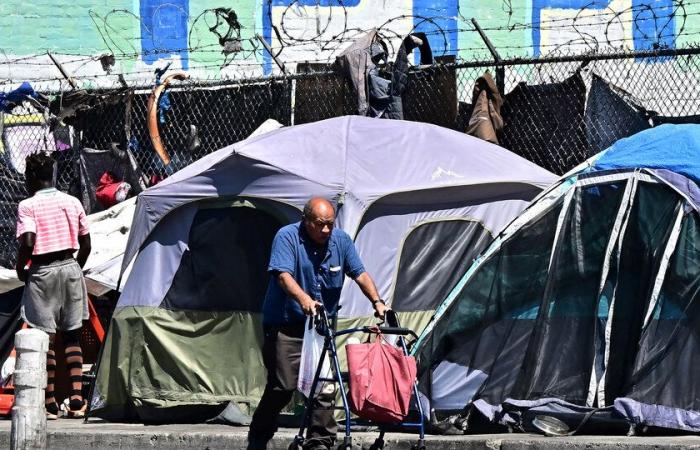The Supreme Court of the United States ratified this Friday the legality of a measure by a small city in the State of Oregon that fines people for sleeping with blankets outdoors and camping with any type of bedding in public spaces, a rule directed against homeless people.
With six votes in favor and three against, the Supreme Court rejected an appeal of unconstitutionality against the law. “Homelessness is complex. Its causes are many, and so are the public policy responses necessary to address it,” the Court indicated in its ruling.
Also considered that homelessness is not covered by the eighth amendment’s prohibition of cruel and unusual punishment. “The Eighth Amendment to the Constitution serves many important functions, but it does not authorize federal judges to take away those rights and responsibilities from the American people and instead dictate this nation’s policy on homelessness,” the judge wrote Neil Gorsuchon behalf of the majority.
The origin of the case
The ruling responds to the case “Grants Pass v. Johnson”, in which a group of homeless people questioned the laws of the city of Grants Pass in this area. To request unconstitutionality, these people relied on the eighth amendment of the Constitution, which states that excessive fines shall not be imposed nor cruel and unusual punishments inflicted. Also to a 1962 Supreme Court ruling that stipulated that it is not a crime to be addicted to narcotics, attempting to make an analogy between homelessness and drug addiction and claiming that both are a status for which citizens cannot They can be punished.
The Supreme Court took up the case after a A coalition of Republican-led states like Arizona and Democratic leaders like California Gov. Gavin Newsom complained that a lower court ruling prevented them from addressing the homeless crisis..
The conservative wing of the Supreme Court argued during the arguments that this is a matter that should be resolved by each state and each city. In statements reported by the media Washington State StandardAttorney Theane Evangelis, who represented the city, argued that the ruling would provide relief to local communities trying to address the problems of homeless encampments.
Ideological differences
The court’s decision was marked by ideological differences among its members. The judge Sonia Sotomayorjoined by Justices Elena Kagan and Ketanji Brown Jackson, wrote that the decision would leave the most vulnerable in society with fewer protections. “Sleeping is a biological need, not a crime. For some people, sleeping on the street is their only option”the judge said as she read her dissent from the bench, a rare gesture indicating deep disagreement, the American newspaper reported. The New York Times.
Those who violate the provision face a fine of $100 and possible prison sentences for repeat offenders. Sotomayor found that jailing and fining such people for sleeping in any public place at any time, including in their cars if they use just a blanket to keep warm or a rolled-up T-shirt as a pillow, as the city of Grants Pass does, was unacceptable and unconstitutional. “The purpose, text and application of the ordinances confirm that they target status, not conduct. For someone who has no available housing, the only way to comply with the ordinances is to leave Grants Pass completely,” he criticized.
Advocates for the homeless said older adults, LGBTQ+ people, and people of color are disproportionately affectedthe chain reported Telemundo“This decision sets a dangerous precedent that will cause undue harm to people experiencing homelessness and give free rein to local officials who prefer pointless and costly arrests and incarcerations over real solutions,” Ann Oliva, executive director of the nonprofit National Alliance to End Homelessness, said in a statement. “This tactic has consistently failed to reduce homelessness in the past and will surely fail to reduce homelessness in the future.”
Other local officials agreed. In Los Angeles, one of the epicenters of the homeless situation, Mayor Karen Bass warned cities to Don’t use the ruling as an excuse to arrest your way out of the problem or hide the homeless crisis in neighboring cities or in jail. “Neither will work, neither will save lives, and that route is more costly to taxpayers than actually solving the problem,” he said in a statement cited by The Washington Post.
The recent Supreme Court ruling opens the possibility of changing the way cities and states monitor homelessness, an urgent problem in the United States. According to the latest official data, In 2023 the number of homeless people in the country increased by 12%, and it is estimated that there are more than 650,000In addition, there are some 171,000 homeless people in the city of California alone, which is 40,000 more than six years ago, representing almost a third of the total homeless population in the territory, local media report.


